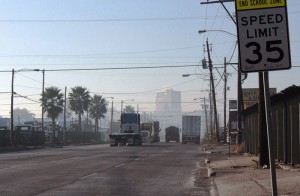Texas Enviromental Regulators Question Ozone’s Impact On Health

Dave Fehling
A pollution haze over Houston East End.
The Texas agency that regulates industries that pollute, the Texas Commission on Environmental Quality, is questioning federal research into the health threat posed by breathing ozone and is using its website to publish articles that critics call “provocative” and “misleading.”
First, some background. Houston has an ozone pollution problem and so do Dallas and big cities across the country that for years have exceeded federal limits for ozone.
Ozone forms when air pollution from industrial plants and vehicles reacts to sunlight. Breathing ozone has long been considered harmful especially to people with conditions like asthma and heart disease.
In coming months, the federal Environmental Protection Agency is expected to issue even stricter, lower limits for ozone which could put even more Texas cities in violation of the federal Clean Air Act. That could cost industry money to upgrade equipment to reduce pollution. And in Texas, where the state has repeatedly — and for the most part, unsuccessfully — sued the EPA to block pollution regulations, state officials are questioning whether ozone at current levels is really all that bad.
“I’m not political. I’m a scientist, and can back up everything I say with data,” said Michael Honeycutt, a toxicologist with the TCEQ.
In an article he authored on the TCEQ’s website, he said the federal government’s data actually show lowering ozone could be bad.
“Houston and Los Angeles are going to lose people, ok? According to EPA, people are going to die from lowering these standards,” Honeycutt told News 88.7.
Which of course would be exactly opposite of what the EPA says it’s trying to do, that is, lower ozone to improve people’s health. Honeycutt bases his findings on what he says he found in the EPA’s 660-page ozone report. Some 222 pages into the report, there is a reference to studies done in Houston and LA which estimated there could be increases in deaths there from lowering ozone.
“What’s happening is, we’re reducing it in some areas but we’re actually increasing it in other areas. EPA’s own data shows this. You’ll be decreasing ozone levels in the suburbs but you’ll actually be increasing ozone levels in the inner cities. Where there are poorer people. So this has a disproportionate impact on poorer people. And this is EPA’s own data saying this,” said Honeycutt.
“That’s why we’re not a proponent of lowering the standard, because if you lower the standard you’re just going to move around where it’s formed. And it’s going to hit the inner cities harder,” said Honeycutt.
Honeycutt’s views were reported last week in the Texas Tribune and drew derision from critics including a brief article in Salon with the headline “Texas Scientist: We don’t need to reduce smog because we spend 90 percent of our time indoors.”
Honeycutt told News 88.7, “They’re saying I’m saying people should stay indoors. Not at all; actually I encourage people to go outdoors.”
But other scientists question how Honeycutt used the EPA data.Dr. Arch Carson at the University of Texas Health Science Center in Houston has done years of research into air pollution’s effect on people’s health and read Honeycutt’s article at our request.
“I think that’s a misinterpretation of EPA’s data,” said Dr. Carson. “He’s interpreted the output of the models of EPAs data to indicate that if you reduce ozone, you’ll cause more deaths. And that’s not at all what it says.”
And regardless of how you interpret the EPA’s data, Carson said their own on-going research at UT shows that when ozone peaks in Houston, more people get sick.
“We can show those pretty dramatically by looking at actual data. Were actually about to publish a paper that looks at those emergency room visits in Harris County,” Dr. Carson told News 88.7. “It’s definitely black and white.”
The TCEQ begs to differ, saying on its website that some studies show no such relationship.
The EPA responded to our questions, saying in an email that there are “a thousand new studies” linking ozone to health problems.
“An independent panel of leading experts that advises the agency has concluded that reducing ozone and improving air quality would lead to broad health benefits, including reducing the overall number of ozone-related deaths,” said the EPA’s emailed response.
